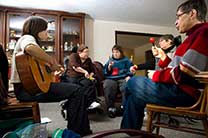Before buying a home, explore the options for funding support services. The funding must be addressed individually for each resident.
Funding from the State and County System
In the state of Ohio, the primary funding for non-group community housing through the local county board is Medicaid HCBS (Home and Community Based Services) Waivers. Supported Living funds may also be an option. The county board administers both Waivers and Supported Living.
In the past, almost all residential services in a person’s home (outside of a licensed facility) were funded with Supported Living funds. Today, Medicaid Waivers are the primary source. The federal government provides a match for these local waiver dollars.
If funding from a public source is essential, complete the application process and have confirmation that your child is eligible for the funding before proceeding. To apply for funding, call the intake department or your child’s Service and Support Administrator as soon as possible—there is always a waiting list.
The types and names of waivers change over time. Ask the support administrator of your local county board about availability of waiver slots in your community.
Currently, four Medicaid Waivers are available from the Ohio DODD:
- The Level One Waiver
- The Individual Options Waiver
- The Transition Waiver
- The Self Waiver
If Your Child Is Not Eligible for State or County Funding
If ineligible for State or county board services, the sources of funding for support services vary depending on where you live.
You must research funding sources yourself. Some places to include in your search are:
- State Medicaid office (Department of Job and Family Services in Ohio)
- Children’s services programs
- Area agencies on aging
- Private insurance
- State vocational rehabilitation agencies
- County or state boards of mental health
- Department of Veteran’s Affairs
- Organizations specific to the disability
- Religious organizations
Helpful Tips
- Although some of these agencies may not provide funding or services, they may suggest other resources.
- If your child is turned down for funding, you should always appeal the decision. Denials are often reversed on the first appeal.
Medicare
Those eligible for Medicare Part A may also be able to receive some home-health benefits. These benefits cover people who are:
- Confined to the home
- Under the care of a physician who develops and periodically reviews a care plan
- In need of an intermediate level of skilled nursing or specific therapy (speech, physical, or continuing occupational therapy)
NOTE: The requirement for home confinement is somewhat controversial. Keep in mind that any services funded under Medicare must be provided by a Medicare-certified home-health agency.
Medicaid Waivers (HCBS)
When ineligible for county board services, Ohio offers two home- and community-based services waivers (HCBS) for people with severe disabilities or medical needs who would otherwise be placed in a nursing home or hospital. They pay for assistance with daily living, skilled therapies, home-delivered meals, minor home modifications, and several other services. .
- Passport Waiver:
- Available to people over the age of 60
- Who need an intermediate level of care in a nursing home
- Home Care Waiver:
- Available to people under the age of 60
- Who require the services of either an intermediate or skilled nursing facility
To Apply
To apply for the Home Care Waiver, parents should contact the County Department of Job and Family Services. Individuals over 60 should contact the Ohio Department of Aging to apply for the Passport Waiver.
Medicaid Home Health Services
Private Duty Nursing:
- Funds services for more than 14 hours each week
- Pays for daily living assistance, nursing services, and skilled therapies.
- A home-services facilitation agency will arrange for an assessment and take applications
- To qualify, must have a medical need, but cannot be living in a nursing home.
State Plan:
- Will pay for up to 14 hours of care per week.
- A doctor’s prescription is needed to apply for CORE.
- Pays for daily living assistance, nursing services, and skilled therapies.
- After getting the prescription, a home-health agency that accepts Medicaid will arrange for the services
- To qualify, must have a medical need, but cannot be living in a nursing home.
For names and numbers of local home-health agencies and home-services facilitation, contact the Medicaid consumer hotline at 1-800-324-8680.
Centers for Independent Living
Consider researching the Centers for Independent Living. They do not directly provide residential services, but offer valuable information on what services are available.
The Centers for Independent Living, numbering in the hundreds in the United States, are nonprofit organizations developed to support people with all types of disabilities.
Since the centers are run locally, they each operate differently. They know specific local resources and can help you link with others in similar situations.
Often, people who have disabilities manage and staff the centers, guaranteeing an empathetic approach to consumer concerns. A Center for Independent Living is a good place to start the search for available resources and to find support and advocacy.
Privately Funded Supports
You may choose to privately fund support services for your child. This can be expensive, depending on the needs of the individuals living in a home. You must look critically at the needs of the individuals in the home, as well as the long-range costs.
Privately funded services have fewer regulations and procedures than publicly funded services. However, if you use private funds to contract with a provider agency, the agency will be required to adhere to many of the same health and safety regulations and procedures, including wages and hours, as with public services.
Cost-Savings Strategies: Be Creative
- Exchange services or other non-cash reimbursement to partially or totally compensate for a salary. For example, offer room and board to staff members.
- House a person needing some physical assistance with someone who needs reminders due to a cognitive disability; the residents could then exchange one type of personal assistance service for another.













